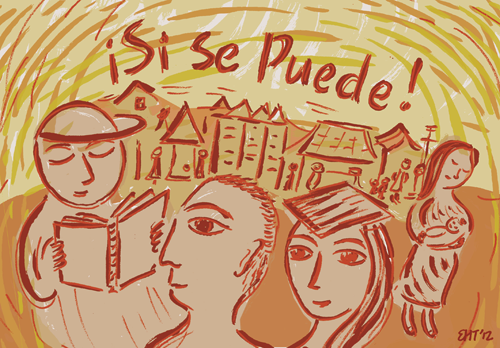
Poverty levels of Latinos in Multnomah County are 77 percent higher than whites.
This is just one of many alarming statistics found in the recent report published by the Coalition of Communities of Color and Portland State, The Latino Community in Multnomah County: An Unsettling Profile.
The report, released on Jan. 25 to an audience that included Governor John Kitzhaber and Portland Commissioner Nick Fish is the product of three years of collaborative research into the state of the Latino community in the county. The results are disturbing, to say the least.
Unemployment amongst Latinos has doubled since 2007. The average annual income of a full-time Latino adult worker is just over $23,000, whereas whites earn close to $45,000. A whopping 43.7 percent of Latinos have not graduated high-school, compared to only 6 percent of whites. And while 60 percent of whites own a home, only 31 percent of Latinos are homeowners.
At a glance, one sees this report is appropriately titled, painting a picture of the Latino community in Multnomah County that is indeed unsettling. Although it acknowledges some positives, such as drops in child poverty and higher academic testing results, the report’s overall diagnosis is bleak, emphasizing that “poverty, low income and lack of access to decent work and education” are defining features of this community.
In light of the numbers, the question begging to be asked is, “How did this happen?”
In a city like Portland that prides itself on its culture of community, open-mindedness and diversity, how can one group of people be so obviously disenfranchised?
Diego Hernandez, coordinator of La Casa Latina, a PSU community center dedicated to the support of Latino university students, suggests it is because no one sees the faces behind the statistics.
“We are the fastest growing demographic, yet we are being brushed aside,” Hernandez said. “I believe education is our way out of poverty, and we need a system that empowers our sense of identity.”
Latinos have long been a rich and significant group woven into Oregon’s identity and culture. In the early 1800s, Latinos came to mine gold and, according to the report, “played a significant role in developing the livestock economy of the eastern range lands of Oregon.”
The report further details the substantial impact of Latinos, particularly in agriculture throughout the 1800s and 1900s, most notably alleviating the farm-labor shortage during WWII and keeping the industry afloat.
So, if Latinos have such an important role in the history of this state, why would they not have a sense of identity here?
The report seems to point to this question too, noting that while Latinos “have served to support the economic growth of the nation, and been laborers for economic expansion, they have not been granted the regard and legitimization that other laboring communities have.” Their relationship with this country, the report states, is one marked by “exploitation, marginalization, exclusion and powerlessness.”
We live in a country that was founded, built and enriched by immigrants, but apparently some immigrants are still treated differently than others. With the faint sounds of Animal Farm in the background, we have created a soundtrack to our movie—a movie within which all the lead actors are white and the rest are background extras. Our political, economic and educational systems are nominated for best supporting roles.
Don’t agree? Well, what about the fact that a Latino has never held a Portland City Council seat or any local representative seat in the Oregon legislature? Latinos are the largest pool of labor for U.S. companies and in essence keep the machine running.
We have a “thanks but no thanks” policy when it comes to immigration. We gladly accept immigrant labor; we even recruit and freely benefit from it. But when it becomes inconvenient for us, we want to send them packing.
If we really did that (a popular idea these days), our entire agricultural industry would tank. Between 53 and 90 percent of all farm workers in the U.S are, according to the report, “migratory, uneducated and living at, or well below, the poverty line.” So, next time someone suggests sending immigrants back home, let’s hope they don’t choke on our organic, handpicked lettuce.
Obviously, this is only one part of the problem; to say that all Latinos’ problems would be solved with immigration reform would be narrow-mindedly pigeon-holing a community into one issue. So, it comes back to identity.
If you don’t exist, you have no voice. If you’re fighting just to pay rent, to get healthcare, to put food on the table—and on top of that have no representation, what kind of future does that spell for a community hidden on the outskirts?
In a day and age where politicians will spout whatever they can to get a vote, it’s the most vulnerable that pay the highest price for inaction. It’s those who don’t have the bullhorns on their side that fall to the wayside once election season is over.
But all is not lost. The report gives Hernandez some hope that things will get better. “It’s giving legitimacy to concerns we’ve always had, proof that change is needed,” Hernandez said.
It’s easy to wonder if things will ever change. But, you don’t have to look far to find the answer. “Next month, members of La Casa will be involved in a conference for Latino high-schoolers—the Edúcate Conference,” Hernandez said. “It’s about empowering them and giving them resources to pursue a post-secondary education.”
“Those of us in university settings need to ask ourselves what we’re doing to bring change,” Hernandez said.
And perhaps we all need to ask ourselves that question if we’re to make any difference at all.
